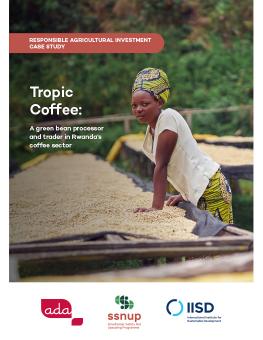
Tropic Coffee
A green bean processor and trader in Rwanda's coffee sector
This case study analyzes the extent to which a small coffee processor and trader in Rwanda complies with international standards for responsible investment in agriculture.
Responsible investment in and by agribusinesses—including crop producers, processors, and traders—can play a transformative role in driving innovation in agrifood systems, building market and supply chain linkages, and contributing to local economies and communities. These outcomes can be enhanced when agribusinesses align their policies, operations, and practices with the Committee on World Food Security’s Principles for Responsible Investment in Agriculture and Food Systems (CFS-RAI).
The agribusiness in this case study, Tropic Coffee, is supported by the impact investor Alterfin as part of the Smallholder Safety Net Up-scaling Programme (SSNUP). This program brings together investors to promote sustainable, climate-smart farming practices and improve food security and living standards in developing countries. It is part of a series aimed at analyzing how well SSNUP investees perform and comply with international standards for responsible business conduct, such as the CFS-RAI.
Tropic Coffee’s mission is to be a leading Rwandan coffee producer by providing specialty coffee that aims to meet international standards while increasing income for local farmers. However, it faces financial difficulties due to competitive rates, the lack of a direct relationship between bean prices obtained and cherry prices paid to farmers, not having its own dry mill, and reduced demand for higher-priced organic coffee given the uncertain global economy.
We measured Tropic Coffee’s compliance with principles for responsible investment across seven key dimensions. Overall, they were found to have a moderately high level of compliance. The founders focus on empowering women by giving them better market access and prices, which helps increase their income. They also help women form savings groups to further support their financial independence.
The case study recommends that, while alignment is moderately high, the board should learn more about principles for responsible investment and business conduct so they can create a clearer strategy and better accountability processes.
Participating experts
You might also be interested in
Responsible Agricultural Practices of a Cocoa Buying Company in Ghana
This case study analyzes the extent to which a small cocoa trader in Ghana complies with international standards for responsible investment in agriculture.
LIMBUA Group Limited
This case study analyzes the extent to which a small agribusiness in Kenya complies with international standards for responsible investment in agriculture.
Mahembe Coffee
This case study analyzes the extent to which a small agribusiness in Rwanda complies with international standards for responsible investment in agriculture.
Sénégalaise des Filières Alimentaires
This case study analyzes the extent to which a small rice miller in Senegal complies with international standards for responsible investment in agriculture.